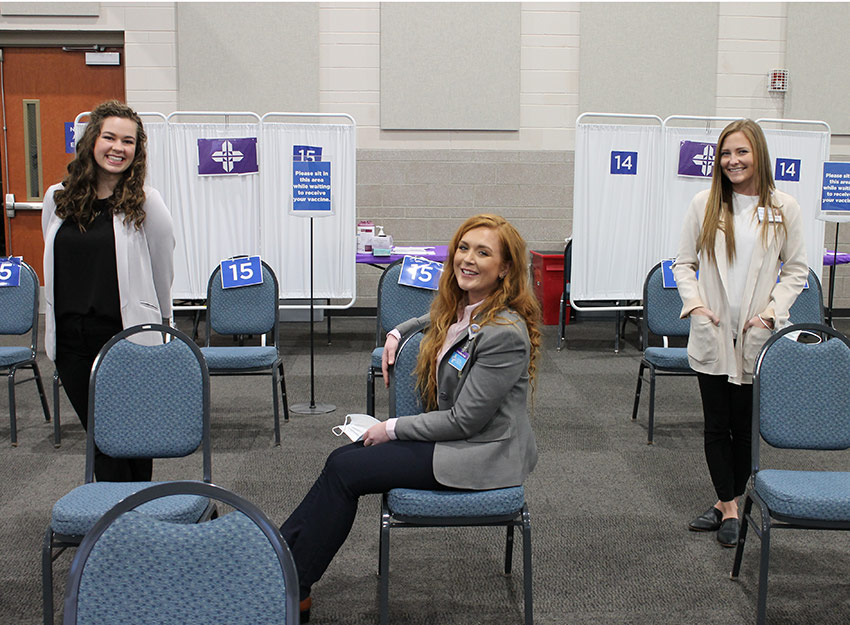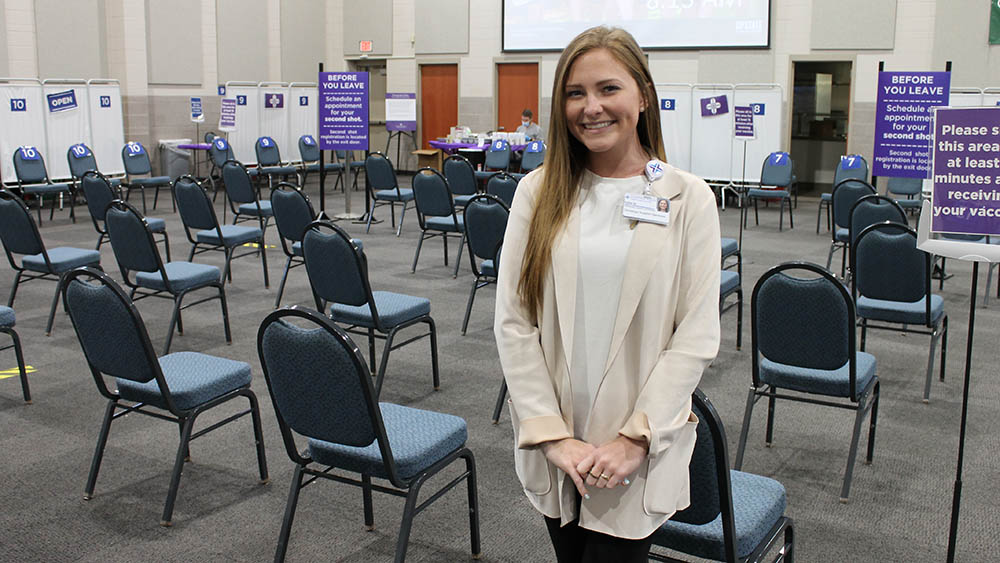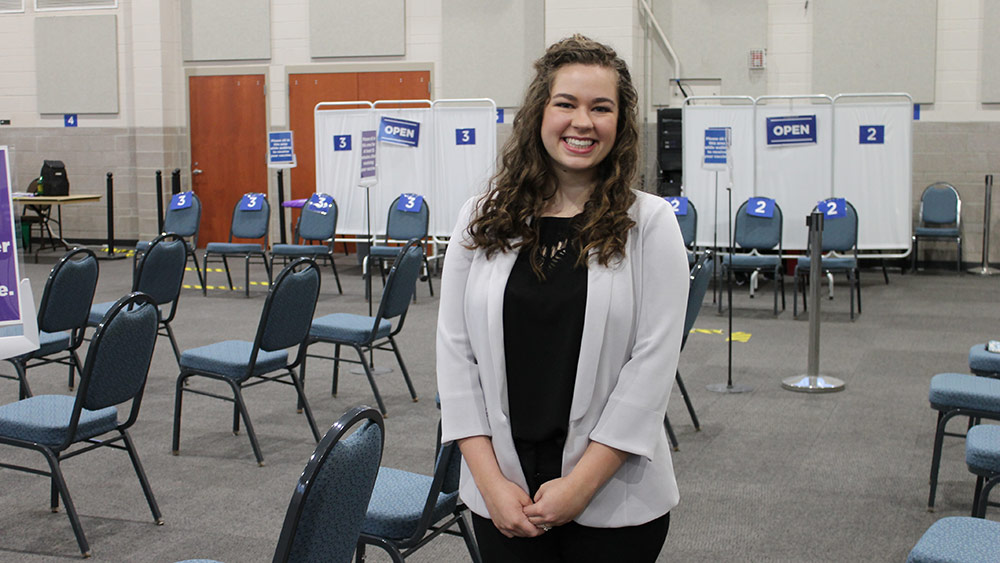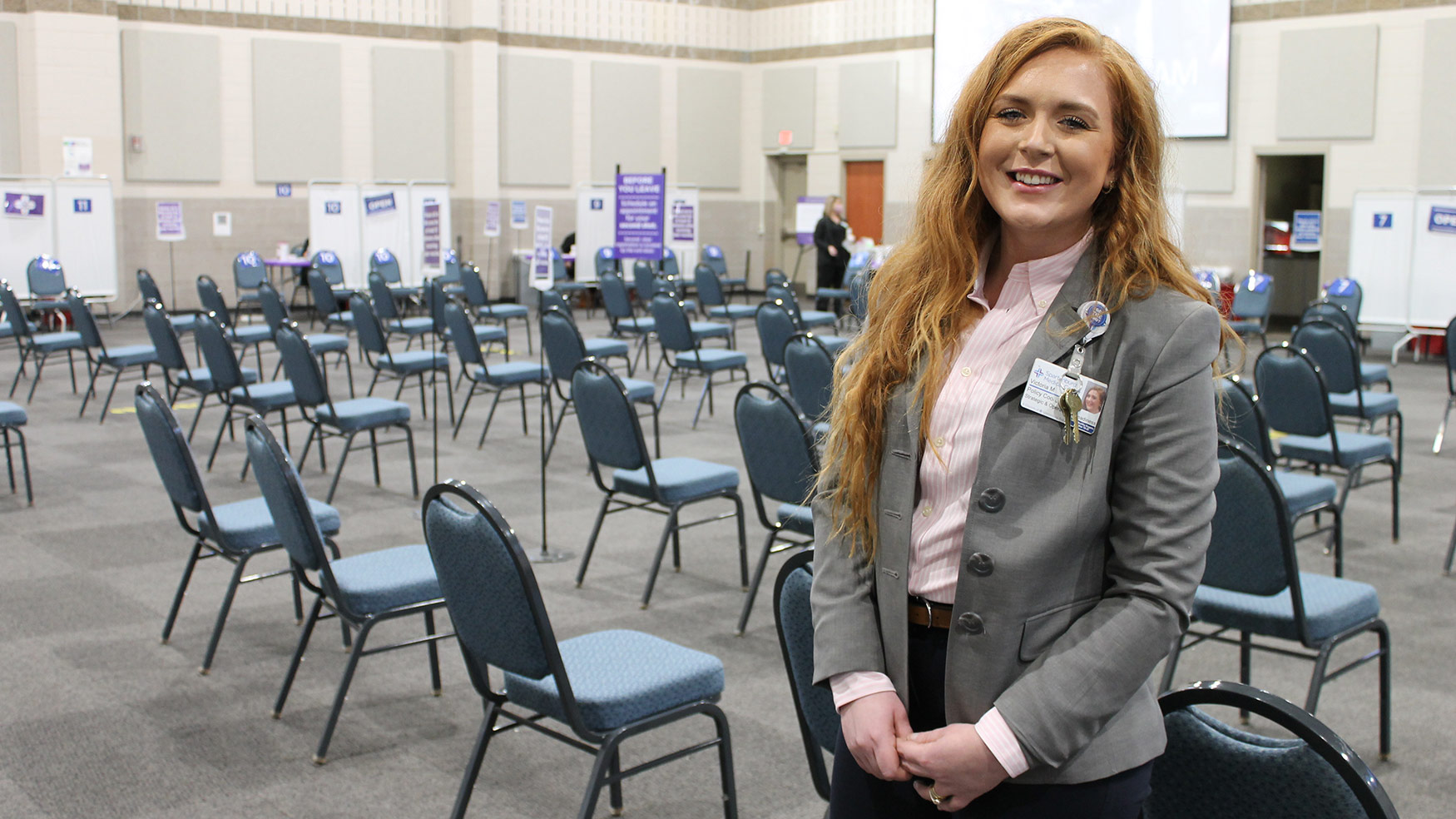Healthcare Administration in Action: Converse Graduates Making a Difference During the Pandemic

At the beginning of their academic journeys in healthcare administration, three Converse graduates– Katie Moss ’20, Hannah Painter ’20, and Victoria Milam ’20 had no idea that their job responsibilities following graduation would include wrangling a pandemic. From strategic and operational readiness, to information and technology, to organizational work in the pharmacy, these graduates support Spartanburg Regional Healthcare System with their talents daily and stand behind healthcare heroes helping to combat COVID-19.
Katie Moss, Community Outreach Coordinator | Multidisciplinary Conferences and Second Opinion Clinic | Oncology Support Services, Class of 2020
What led you to Converse and the healthcare administration program? I originally started as a biology major, and I discovered it wasn’t for me. At the time, I needed an elective course, so I took an elective in healthcare communications and absolutely loved it! About a year later, I declared my major in healthcare administration, and it was on from there.

While you were at Converse, what do you feel like helped you the most, now that you’re in the workplace? Overall, I think that the healthcare administration program really prepared me through a lot of different activities outside of the classroom. Dr. David Church, (Adjunct Instructor in Healthcare Administration and Vice President for Oncology and Support Services at Spartanburg Regional Healthcare System) Professor Tracie Rodak (PT, MHA, Director in Rehabilitation Services) and Professor Lori McMillan (Vice President of Professional Services at Spartanburg Regional) really strived to get us into the healthcare field through letting us see the field first-hand. We were able to go into different healthcare facilities around Spartanburg to see what healthcare administration really looked like.
In my public health class with Professor Rodak, we went on five-day trips to different facilities in the area during class time. She focused on letting us see the inner workings of Spartanburg Regional Healthcare System and what our patients go through to see what public health looks like. Those experiences really piqued my interest and helped me gain clarity for the direction that I wanted to go in my career.
How do Converse Healthcare Administration professors help you succeed? Our professors who actively work at Spartanburg Regional hold internships each year, and they really take you under their wings and let you explore all of the different departments to find where your interest is. My favorite memories in the program were my internships. I completed two internships at Spartanburg Regional – one with the executive offices and one with Gibbs Cancer Center & Research Institute. The pandemic hit in the middle of my internship with the Gibbs Cancer Center, so I had to transition to doing it online, and it was an adjustment. Finishing my internship in the middle of the pandemic and getting the “Intern of the Year” award at both of my internships were some of my favorite memories as a student.
I’m proud to say that I am now working for Gibbs Cancer Center in Information and Technology. I didn’t know exactly what the job was going to entail, but now I’m managing multidisciplinary clinics with our medical oncologists and coordinating oncology support services. Seeing various specialty oncologists come together for patient cases makes me proud to be where I am. I would have never had this opportunity without Converse and the professors at Converse.
“I would have never had this opportunity without Converse and the professors at Converse. “
How did the coursework at Converse apply to your current job responsibilities? At Converse, we had a course called Healthcare Informatics and Technology, and that prepared me to be in a healthcare setting but working in IT. Our communications classes taught me a lot as well, and Professor McMillan equipped me to be able to approach sensitive situations. I think that all of the courses prepared me to be where I am today. Sometimes, scenarios will come up in my everyday work, and I remember and apply things that I learned during my time at Converse.
What are some of the responsibilities you have taken on amid COVID-19? I’m currently supporting Marketing and Communications with COVID-19 vaccine sign-ups and helping with administrative roles for vaccine clinic locations. I know a lot of our Spartanburg Regional patients are coming to get vaccines and they truly appreciate the work we are doing to make the process easier and smoother. Seeing different departments come together for this has opened my eyes to the pandemic and the things we are doing to get COVID-19 under control, and I’m proud to be making a difference in our community.
What are your hopes for Healthcare Administration at Converse? I really want to see the healthcare administration program at Converse grow as much as possible. I plan to get my MBA, and after that, I want to get a degree to be able to teach undergraduate students, and I would love to return to Converse and teach because I know that it is such a great program.
Hannah Painter, Administrative Assistant, Class of 2020
How did your experience at Converse equip you for the workplace? The experience I gained that helped me tremendously was public speaking and communication skills. During my freshman year, presentations made me really nervous, and I didn’t like talking in front of people. But now, talking in front of people doesn’t make me nervous at all. After my senior year and all of the projects and presentations I did, I really grew in that area through this program. Now, I am very thankful for the communication skills and presentation skills I learned and use every day working at Spartanburg Regional. The healthcare administration program was the perfect mix of being in healthcare and business, so it was a perfect fit for me.
“The healthcare administration program was the perfect mix of being in healthcare and business.”
What was one of your favorite memories at Converse? I think my favorite memory was completing the senior capstone project. Everything you learned in your healthcare administration classes was packed into a 20-minute presentation during your senior year. As part of it, you interview someone who works at Spartanburg Regional in a field that you are interested in, and then you put it together into a paper and presentation. It felt great to do the presentation with confidence and be finished with it, knowing I learned the communication skills and was ready to apply them to the workplace.

How have you been able to apply what you’ve learned at Converse into the real world, amid the pandemic? I use the knowledge that I learned in my classes every day. I work in the pharmacy, organizing and keeping track of supplies for the COVID-19 vaccines. I order supplies and pack the bags that the vaccines will go into, so I have a supportive role in getting supplies ready to be administered. I have the knowledge that I learned in my classes in the back of my head so that I can apply the knowledge to various scenarios and situations. I also really liked having professors who were sorting through real-life scenarios as they were teaching us. I’m thankful for their willingness to allow us to think through those real situations and learn from it.
I did an internship with Dr. David Church and Professor Lori McMillan and also with the Director of Pharmacy at Spartanburg Regional.I was offered a job following my internship in the pharmacy department.
Being a part of organizing medicines for COVID-19 patients, and now vaccine supplies, and just seeing all of the pharmacists rally together for this with the other disciplines, makes me really proud to be part of the team at Spartanburg Regional.
Victoria Milam, Policy Coordinator | Strategic and Operational Readiness, Class of 2020
While you were at Converse, what do you feel like helped you the most, now that you’re in the workplace? I would say that interning is essential– getting your toes wet and getting physical experience of what it’s like to be a healthcare administrator is so important. In addition, the communications classes and case studies that we examined were so helpful.
Can you tell me more about your time as a student at Converse and one of your favorite memories? I was a Converse II student, so I was non-traditional, and I began the program when my daughter was 3 months old. One of my favorite memories was getting the Omicron Delta Kappa recognition, and having my daughter there at that ceremony. When I accepted the award and the pin, it was such a special moment having her there with me, wearing Converse purple.
How have you been able to apply what you learned at Converse to your current job and the challenges with COVID-19? I work in Strategic and Operational Readiness, and in our department, my job is policy and procedures. This involves working with various leaders, anywhere from clinical to non-clinical and ensuring that they are meeting the regulatory requirements and that their policies are expressing what we’re doing.

It also has a lot to do with document control and making sure documents are up-to-date. When the pandemic hit, I didn’t realize, and I don’t think anybody realized what it was going to do to transform our day-to-day lives. So, the stress you go through in college whenever you have the pressure, timelines and deadlines, and a capstone or various projects, it certainly helps prepare you for the pressure you experience in your professional role.
There wasn’t a class to prepare us for what we experienced with the pandemic, but Professor Lori McMillan’s epidemiology courses gave us some understanding. The resilience that you develop under pressure, the experience you gain working with others, and having to be flexible, is fundamental, and it will prepare you for situations like this.
“The resilience that you develop under pressure, the experience you gain working with others, and having to be flexible, is fundamental, and it will prepare you for situations like this. “
What are some of your responsibilities in your current role? Through Strategic and Operational Readiness, our department handles communicating with DHEC, our overseeing entities, Centers for Medicare and Medicaid Services, and many public health responsibilities. My education from Converse gives me the confidence to step up and jump into things.
When we began the vaccine clinic, we knew we needed to accomplish three things: to work with the pharmacy to receive the vaccine, to get people in the door through scheduling, and to figure out how we were going to staff the clinics and administer the vaccine.
The leadership at Spartanburg Regional took a systemic approach to this and it involved people from various departments all over the healthcare system– from pharmacy to marketing and communications, to clinical staff, and my department.
I was brought in to assist with staffing our clinics, so I sent out emails to those who had the credentials to administer the vaccine, messaging that we would “hit COVID-19 where it hurts.” The volunteers showed up, and they continue to show up, many of them volunteering time to administer vaccines.
During this process of getting the vaccine clinic up and running, there was something exciting about seeing the full circle from when the pandemic started and seeing the numbers of those affected by COVID-19, seeing people here, and receiving vaccines. It’s a beautiful thing, and I love seeing that new perspective at the clinic.
What have you been proud to be a part of in your work? I love being able to support healthcare professionals so that they can focus on patient care rather than all of regulatory policies and procedures. My department is there to keep them on track, help them keep up to date, and help coordinate different tasks that have to be done to focus on patient care. I proudly support them in my role and I don’t think there’s anything I could be more proud of than to be standing behind these folks who are helping to combat COVID-19.
Who will build and strengthen our academic programs to be responsive for the future? We Will.